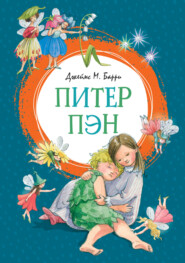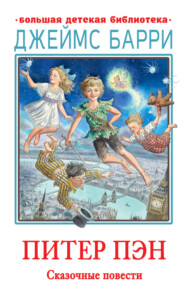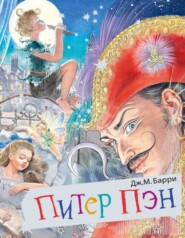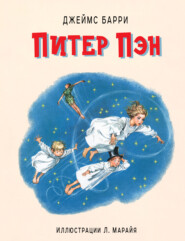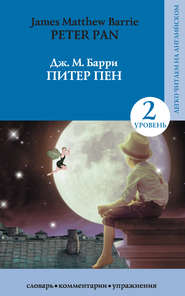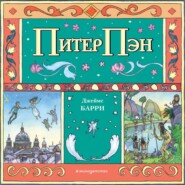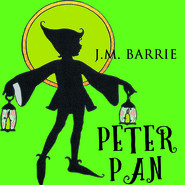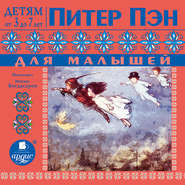По всем вопросам обращайтесь на: info@litportal.ru
(©) 2003-2024.
✖
The Little Minister
Настройки чтения
Размер шрифта
Высота строк
Поля
“I’ve been thinking,” she said, “o’ something that proves the lassie to be just an Egyptian. Ay, I noticed she wasna nane awed when I said you was the Auld Licht minister. Weel, I’se uphaud that came frae her living ower muckle in the open air. Is there no’ a smell o’ burning in the house?”
“I have noticed it,” Gavin answered, sniffing, “since you came in. I was busy until then, putting on the kettle. The smell is becoming worse.”
Nanny had seen the empty kettle on the fire as he began to speak, and so solved the mystery. Her first thought was to snatch the kettle out of the blaze, but remembering who had put it there, she dared not. She sidled toward the hearth instead, and saying craftily, “Ay, here it is; it’s a clout among the peats,” softly laid the kettle on the earthen floor. It was still red with sparks, however, when the gypsy reappeared.
“Who burned the kettle?” she asked, ignoring Nanny’s signs.
“Lassie,” Nanny said, “it was me;” but Gavin, flushing, confessed his guilt.
“Oh, you stupid!” exclaimed the Egyptian, shaking 129 her two ounces of tea (which then cost six shillings the pound) in his face.
At this Nanny wrung her hands, crying, “That’s waur than swearing.”
“If men,” said the gypsy, severely, “would keep their hands in their pockets all day, the world’s affairs would be more easily managed.”
“Wheesht!” cried Nanny, “if Mr. Dishart cared to set his mind to it, he could make the kettle boil quicker than you or me. But his thochts is on higher things.”
“No higher than this,” retorted the gypsy, holding her hand level with her brow. “Confess, Mr. Dishart, that this is the exact height of what you were thinking about. See, Nanny, he is blushing as if I meant that he had been thinking about me. He cannot answer, Nanny: we have found him out.”
“And kindly of him it is no to answer,” said Nanny, who had been examining the gypsy’s various purchases; “for what could he answer, except that he would need to be sure o’ living a thousand years afore he could spare five minutes on you or me? Of course it would be different if we sat under him.”
“And yet,” said the Egyptian, with great solemnity, “he is to drink tea at that very table. I hope you are sensible of the honour, Nanny.”
“Am I no?” said Nanny, whose education had not included sarcasm. “I’m trying to keep frae thinking o’t till he’s gone, in case I should let the teapot fall.”
“You have nothing to thank me for, Nanny,” said Gavin, “but much for which to thank this – this – ”
“This haggarty-taggarty Egyptian,” suggested the girl. Then, looking at Gavin curiously, she said, “But my name is Babbie.”
“That’s short for Barbara,” said Nanny; “but Babbie what?”
“Yes, Babbie Watt,” replied the gypsy, as if one name were as good as another.
“Weel, then, lift the lid off the kettle, Babbie,” said Nanny, “for it’s boiling ower.”
Gavin looked at Nanny with admiration and envy, for she had said Babbie as coolly as if it was the name of a pepper-box.
Babbie tucked up her sleeves to wash Nanny’s cups and saucers, which even in the most prosperous days of the mud house had only been in use once a week, and Gavin was so eager to help that he bumped his head on the plate-rack.
“Sit there,” said Babbie, authoritatively, pointing, with a cup in her hand, to a stool, “and don’t rise till I give you permission.”
To Nanny’s amazement, he did as he was bid.
“I got the things in the little shop you told me of,” the Egyptian continued, addressing the mistress of the house, “but the horrid man would not give them to me until he had seen my money.”
“Enoch would be suspicious o’ you,” Nanny explained, “you being an Egyptian.”
“Ah,” said Babbie, with a side-glance at the minister, “I am only an Egyptian. Is that why you dislike me, Mr. Dishart?”
Gavin hesitated foolishly over his answer, and the Egyptian, with a towel round her waist, made a pretty gesture of despair.
“He neither likes you nor dislikes you,” Nanny explained; “you forget he’s a minister.”
“That is what I cannot endure,” said Babbie, putting the towel to her eyes, “to be neither liked nor disliked. Please hate me, Mr. Dishart, if you cannot lo – ove me.”
Her face was behind the towel, and Gavin could not decide whether it was the face or the towel that shook with agitation. He gave Nanny a look that asked, “Is she really crying?” and Nanny telegraphed back, “I question it.”
“Come, come,” said the minister, gallantly, “I did not say that I disliked you.”
Even this desperate compliment had not the desired effect, for the gypsy continued to sob behind her screen.
“I can honestly say,” went on Gavin, as solemnly as if he were making a statement in a court of justice, “that I like you.”
Then the Egyptian let drop her towel, and replied with equal solemnity:
“Oh, tank oo! Nanny, the minister says me is a dood ’ittle dirl.”
“He didna gang that length,” said Nanny, sharply, to cover Gavin’s confusion. “Set the things, Babbie, and I’ll make the tea.”
The Egyptian obeyed demurely, pretending to wipe her eyes every time Gavin looked at her. He frowned at this, and then she affected to be too overcome to go on with her work.
“Tell me, Nanny,” she asked presently, “what sort of man this Enoch is, from whom I bought the things?”
“He is not very regular, I fear,” answered Gavin, who felt that he had sat silent and self-conscious on his stool too long.
“Do you mean that he drinks?” asked Babbie.
“No, I mean regular in his attendance.”
The Egyptian’s face showed no enlightenment.
“His attendance at church,” Gavin explained.
“He’s far frae it,” said Nanny, “and as a body kens, Joe Cruickshanks, the atheist, has the wite o’ that. The scoundrel telled Enoch that the great ministers in Edinbury and London believed in no hell except sic as your ain conscience made for you, and ever since syne Enoch has been careless about the future state.”
“Ah,” said Babbie, waving the Church aside, “what I want to know is whether he is a single man.”
“He is not,” Gavin replied; “but why do you want to know that?”
“Because single men are such gossips. I am sorry he is not single, as I want him to repeat to everybody what I told him.”
“Trust him to tell Susy,” said Nanny, “and Susy to tell the town.”
“His wife is a gossip?”
“Ay, she’s aye tonguing, especially about her teeth. They’re folk wi’ siller, and she has a set o’ false teeth. It’s fair scumfishing to hear her blawing about thae teeth, she’s so fleid we dinna ken that they’re false.”
Nanny had spoken jealously, but suddenly she trembled with apprehension.






